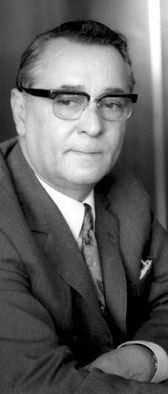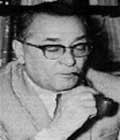Parwiz Natel Chanlari
Parwiz Natel Chanlari ( Persian پرویز ناتل خانلری Parwiz Nātel-Chānlari , DMG Parvīz Nātel-Ḫānlarī , English Parviz Natel-Khanlari ; * March 20, 1914 in Tehran ; † August 23, 1990 in Tehran) was an Iranian writer, professor of Persian literature at Tehran University , minister in the cabinet of Prime Minister Asadollah Alam and senator in the Iranian Senate. Until the Islamic Revolution he was the head of the Iranian cultural institute Bonyad-e Farhang-e Iran . Parwiz Natel Chanlari was married to Zahra Chanlari and had two children.
Early years
Parwiz Natel Chanlari was born in Tehran in 1914 as the only son of an employee of the Foreign Ministry. His father died when Parwiz was 10 years old. Parwiz first attended the French Jesuit School in Tehran, then the Alborz Grammar School and graduated from Dar-ol Fonun .
From a young age Parviz was interested in Persian literature. He visited the poet Nima Youschidsch and offered himself to him as a typist just to be able to hear his latest poems.
Parwiz Natel Chanlari completed his schooling in 1938 with a degree in Iranian literature and began to work for the Ministry of Education after his military service. He also worked as a teacher to supplement his meager income. During this time he published his most famous poem, Oghab (The Eagle).
In 1942 Parwiz Natel Chanlari enrolled in the newly established doctoral program for Iranian literature at the University of Tehran. There he met his future wife Zahra. She is described as an unusual independent woman who came from a famous family. Her grandfather was Sheikh Fazlollah Nuri , who had opposed the democratic reforms of the Constitutional Revolution and was hanged for it in 1909. Like Parwiz, Zahra was a teacher, later a university professor, scientist, translator and author of children's books.
Editor of the literary magazine "Sochan" in 1943
In May 1943, together with his friend Zabihollah Safa, founded the literary magazine Sochan and worked as its editor until the beginning of the Islamic Revolution. Sochan was initially one of the few magazines that could go to print without prior censorship approval. However, this freedom of movement was abolished from 1970. In the 35-year history of the magazine, more than two hundred Iranian writers and poets had contributed. The aim of the magazine was to inform Iran about the developments in the literary scene in the world. Two groups were named as opponents of the magazine in the 1972 editorial, those who oppose any renewal and those who have no roots in the past.
The magazine ceased to appear for a short time in 1948 when Parwiz Natel Chanlari went to France to study phonetics and linguistics at the Sorbonne . After his return from France he took up a teaching position at the University of Tehran.
After Asadollah Alam became Minister of the Interior after the fall of Mossadegh in 1953, Parwiz Natel Chanlari took over the position of Undersecretary in the Ministry of the Interior. About his meeting with Shah Mohammad Reza Pahlavi during this time, he wrote that the Shah had urgently asked him to serve the country.
After Alam's resignation, Parwiz Natel Chanlari left the Home Office and went to the United States for a year. There he received the news that he had been appointed to the Senate. There he met with Ali Daschti and Seyyed Hassan Taqizadeh to discuss literary issues.
Minister of Education - Creation of the Army of Knowledge in 1963
When Asadollah Alam became Prime Minister in 1962, he appointed Parwiz Natel Chanlari to his cabinet as Minister of Education and Culture. In this position he developed the idea of training conscripts in short courses to become teachers and sending them to rural regions in the fight against illiteracy . In October 1963, as part of the reforms of the White Revolution , parliament passed a law mandating the Ministry of Education and the Ministry of Defense to make conscripts who had graduated from high school as auxiliary teachers, the Army of Knowledge (Sepah-e Danesch) , in order to remedy the acute teacher shortage in the villages. Young conscripts were able to register for this alternative service after completing their basic training and were then sent to the relevant village schools after four months of training. Anyone who had started studying before completing their military service could complete it and was then obliged to do their military service with the Army of Knowledge .
Resistance to Khomeini
In June 1963, when the government learned of the planned demonstrations against the reforms of the White Revolution, it was Parwiz Natel Chanlari who recognized the dimensions of the political conflict. He knew the mullahs and therefore spoke out in favor of tough action. “If we don't stand together and flex our muscles, we will see a revolution.” Alam followed his friend's advice and the government cracked down on the protesters. In the end, the initiator of the unrest, the then little-known Ruhollah Khomeini, was arrested. Six months later, Alam was forced to resign due to continued criticism of his crackdown on protesters and Khomeini's arrest. This also ended Chanlari's political career.
Establishment of the Foundation for Iranian Culture in 1964
Immediately after leaving the government, he founded the Bonyad-e Farhang-e Iran (Foundation for Iranian Culture) in 1964 with the support of Shahbanu Farah Pahlavi . The foundation was to become one of the most important institutions of classical Persian literature. Chanlari built a library with over 17,000 volumes on Persian literature. Parwiz Natel Chanlari brought out over 300 book publications up to the Islamic Revolution in 1978, including the anthologies on classical Persian intellectual history edited by Zabihollah Safa .
During these years Parwiz Natel Chanlari finally found the time for a new Hafis edition, which he prepared from fourteen different manuscripts. It is still the standard edition today. At this point in time at the latest, Parwiz Natel Chanlari had become one of the world's outstanding literary scholars of Persian literature . Parwiz Natel Chanlari has published several hundred magazine articles and over twenty books. His standard three-volume work on the history of the Persian language became particularly famous. He was the editor of another twenty books.
Islamic Revolution 1978
With the Islamic Revolution in 1978, scientific work for Persian literature came to an abrupt end. After his campaign against Khomeini became known in 1963, he was immediately arrested and the foundation he ran was closed. There was never a formal trial because the allegations against him that he had moved billions of dollars abroad were completely unfounded. Parwiz Natel Chanlari wrote in a defense letter that he had only lived in his life on what he had earned through his income as a professor, minister or head of the foundation and through his literary works, and that he did not make extensive use of this modest income Land ownership and other assets have been able to develop. At the end of his life, the man who had served his country and Persian literature all his life found himself a prisoner, poor, lonely and accused of crimes he had not committed.
The few possessions that Parwiz Natel Chanlari had were confiscated despite all objections. Due to his poor health, he was released from prison. He received an offer to go abroad and work as the tutor of Crown Prince Cyrus Reza Pahlavi . Parwiz Natel Chanlari refused. Parwiz Natel Chanlari died in August 1990. His wife Zahra was only to outlive him by a few months.
Works
- Zabān Schenasi va Zabān-e Farsi. Amirkabir, Tehran 1964.
- Tarich-e Zabān-e Farsi. 3 volumes. Tehran 1348 (1969).
literature
- Abbas Milani: Eminent Persians. Syracuse University Press, 2008, pp. 971-977.
Individual evidence
- ↑ https://choqorok.com/@bargi_az_tarikh/page/7
- ↑ Parviz Natel-Khanlari: Editorial Sokhan. Mordad 1351 (August 1972)
- ↑ a b Abbas Milani: Eminent Persians. Syracuse University Press, 2008, p. 975.
- ↑ Gholam Reza Afkhami: The life and times of the Shah. UC Press 2009. p. 229.
- ↑ Archived copy ( Memento of the original from July 15, 2012 in the web archive archive.today ) Info: The archive link was automatically inserted and not yet checked. Please check the original and archive link according to the instructions and then remove this notice.
- ↑ Abbas Milani: Eminent Persians. Syracuse University Press, 2008, p. 977.
| personal data | |
|---|---|
| SURNAME | Chanlari, Parwiz mobile phone |
| ALTERNATIVE NAMES | Natel-Khanlari, Parviz; Ḫānlarī, Parvīz Nātel; پرویز ناتل خانلری (Persian) |
| BRIEF DESCRIPTION | Iranian literary scholar, professor of Iranian studies at Tehran University, minister |
| DATE OF BIRTH | March 20, 1914 |
| PLACE OF BIRTH | Tehran , Iran |
| DATE OF DEATH | 23rd August 1990 |
| Place of death | Tehran |



